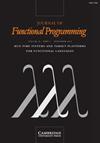有针对性地解决回避问题
IF 0.6
3区 计算机科学
Q4 COMPUTER SCIENCE, SOFTWARE ENGINEERING
引用次数: 2
摘要
在ml风格的模块类型理论中,密封通常会导致类型变量必须离开作用域的情况,这就需要签名来避免这些变量。不幸的是,通常不存在避免变量的最佳签名,因此模块并不总是享受主体签名。这种现象被称为回避问题。在过去,使用各种移动变量的设备可以避免这个问题,这样它们就可以保持在范围内。这些设备可以工作,但迄今为止缺乏逻辑基础。它们还缺乏动态语义与静态语义在相同的短语上给出的表示,这限制了它们的应用。我们可以提供一个最好的超级签名,通过添加一个存在签名,它是其实例的最小上界。这个想法很老了,但是一个可行的元理论以前还没有被提出。这项工作利用从聚焦逻辑中借鉴的思想来解决元理论问题。我们表明,新的理论结果的类型纪律非常类似于上述设备在以前的工作中使用。顺便说一句,这为ML模块的静态语义早期使用的生成戳戳提供了类型理论的依据。所有的证明都在Coq中形式化。本文章由计算机程序翻译,如有差异,请以英文原文为准。
A focused solution to the avoidance problem
Abstract In ML-style module type theory, sealing often leads to situations in which type variables must leave scope, and this creates a need for signatures that avoid such variables. Unfortunately, in general, there is no best signature that avoids a variable, so modules do not always enjoy principal signatures. This observation is called the avoidance problem. In the past, the problem has been circumvented using a variety of devices for moving variables so they can remain in scope. These devices work, but have heretofore lacked a logical foundation. They have also lacked a presentation in which the dynamic semantics is given on the same phrases as the static semantics, which limits their applications. We can provide a best supersignature avoiding a variable by fiat, by adding an existential signature that is the least upper bound of its instances. This idea is old, but a workable metatheory has not previously been worked out. This work resolves the metatheoretic issues using ideas borrowed from focused logic. We show that the new theory results in a type discipline very similar to the aforementioned devices used in prior work. In passing, this gives a type-theoretic justification for the generative stamps used in the early days of the static semantics of ML modules. All the proofs are formalized in Coq.
求助全文
通过发布文献求助,成功后即可免费获取论文全文。
去求助
来源期刊

Journal of Functional Programming
工程技术-计算机:软件工程
CiteScore
1.70
自引率
0.00%
发文量
9
审稿时长
>12 weeks
期刊介绍:
Journal of Functional Programming is the only journal devoted solely to the design, implementation, and application of functional programming languages, spanning the range from mathematical theory to industrial practice. Topics covered include functional languages and extensions, implementation techniques, reasoning and proof, program transformation and synthesis, type systems, type theory, language-based security, memory management, parallelism and applications. The journal is of interest to computer scientists, software engineers, programming language researchers and mathematicians interested in the logical foundations of programming.
 求助内容:
求助内容: 应助结果提醒方式:
应助结果提醒方式:


